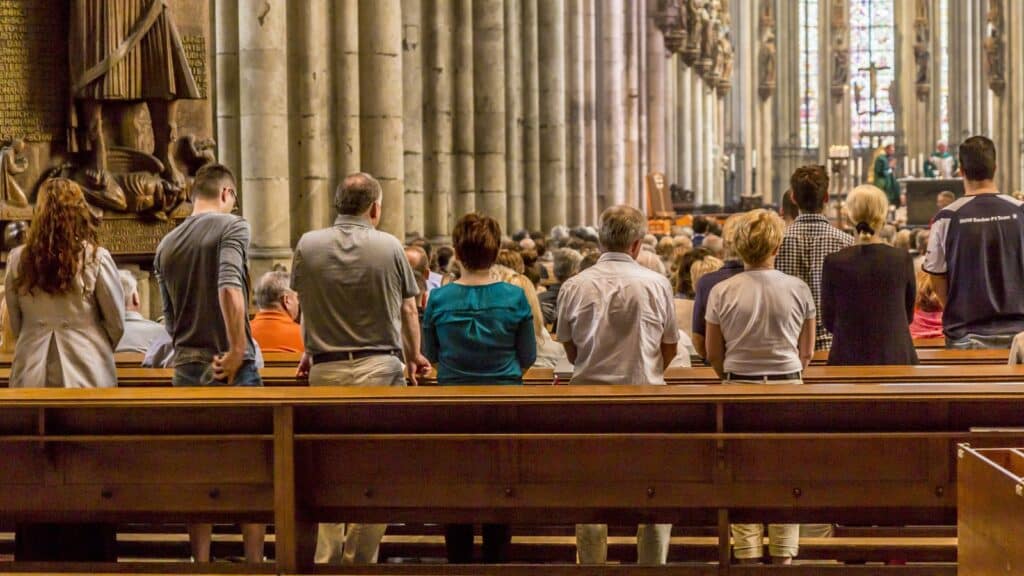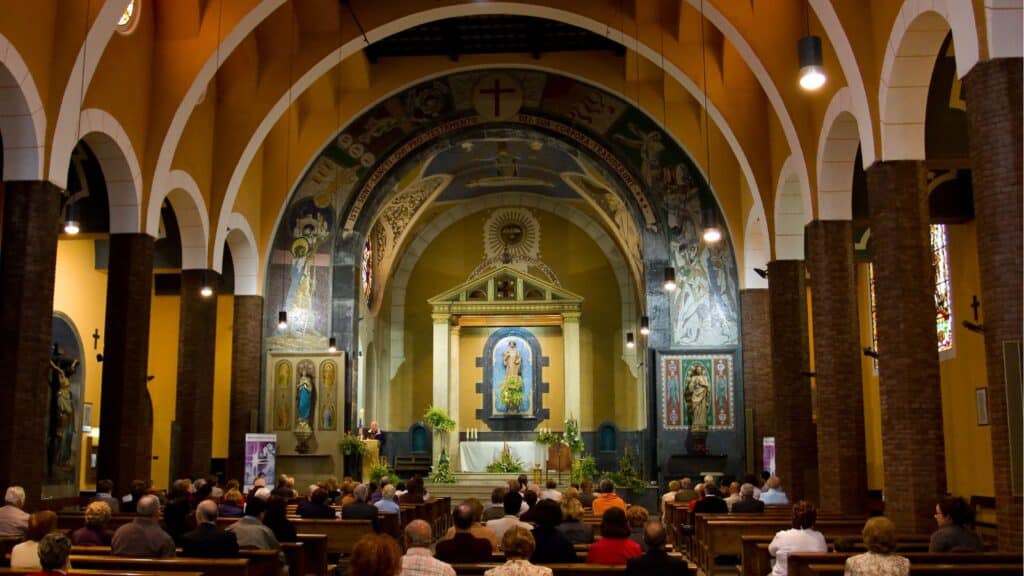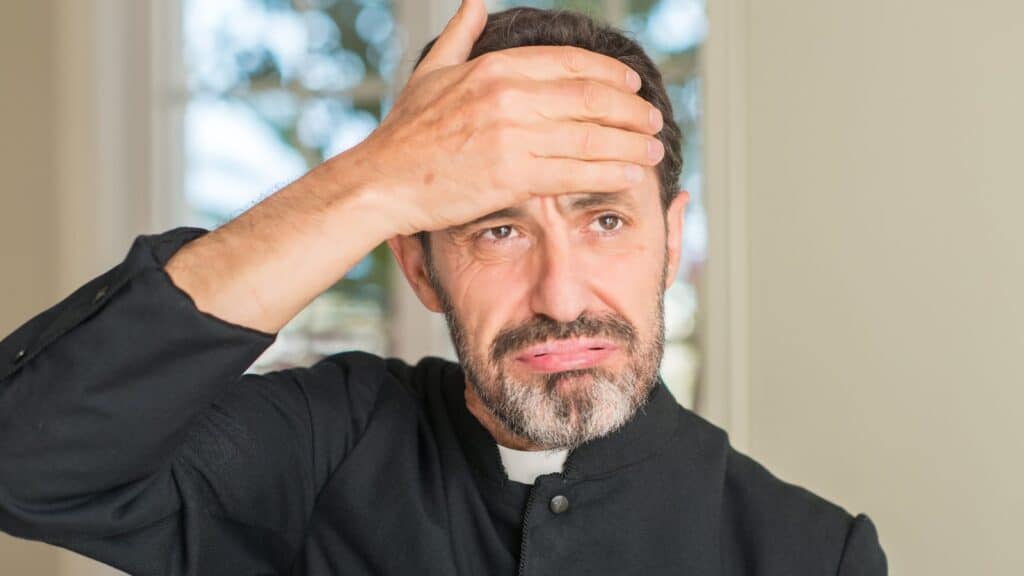It seems like every other day, there’s a new story about young people drifting away from the Catholic Church. But why? They’re not just disagreeing on a few things, as young people’s view of the world is changing, including the places where they invest their time and faith. Today, we’re looking at 25 reasons why young people aren’t sticking with the Church anymore.
Stuck in the Past?

When it comes to things like LGBTQ+ rights and gender equality, many young people see the Church as outdated. They’re living in a far more inclusive and progressive world, so they expect the same from any institution they’re from. Many young people think the Church doesn’t represent them, and they’d rather just call it quits.
Not Enough Likes

If it’s not online, does it even exist? Young people are glued to the screens, and the Church hasn’t quite caught up with this. They’re looking for interactive and digital-friendly ways to connect, meaning that weekly service in a physical building isn’t cutting it for them anymore. If it wants to keep up with the times, the Church needs a digital makeover.
Damaging Scandals

With all those abuse and corruption scandals, a lot of young people are questioning the morality of the Church and its leaders. After all, you can’t exactly stand by an organization that preaches one thing and does another. This kind of hypocrisy is a major turn-off, especially for a generation that cares a lot about accountability.
Keeping It Real

Likewise, a lot of young people crave authenticity and real connections, which they think the Church lacks, thanks to its formality. Young people are drawn to places with genuine relationships, just without all the rituals. Instead of just going through the motions, they want to feel a personal touch.
Money Matters

Similarly, younger generations want more transparency about where their money and donations are going. Anything less than that feels like a betrayal to them. They want to be part of institutions that show where every penny goes and use their contributions effectively and ethically.
Too Much Fundraising

Nobody likes to feel like they’re constantly being asked for money. When young people think churches are focusing on fundraising too much, they’re happy to ditch the whole thing. They don’t think money should matter most, but spiritual growth and community support. Can you blame them?
Science vs Faith

We’re living in the age of science, and when the Church questions science, it doesn’t sit right with the younger generation. For example, some churches don’t believe in evolution and actively teach their flock the same. Young people are strong supporters of science, and they can’t sit by something that seems to be the opposite of this.
Show Me the Proof

Facts and data reign supreme in today’s world, meaning that faith-based beliefs are a hard sell for the younger crowd. They don’t mind believing as long as it comes with some reason and proof. Most Churches encourage their flock to believe blindly instead of looking for evidence. For a lot of young people, this isn’t good enough.
Love Knows No Bounds

America is a melting pot, but so is the rest of the world, and many people young people are in relationships that cross traditional faith lines. When some Church leaders speak out against interfaith marriage or relationships, it doesn’t vibe with young people. They believe that love should come first.
Going Green

Polls show that young people care a lot about protecting the environment, and they’re marching in climate strikes and pushing for greener policies. Unfortunately, many of them believe Church leaders aren’t doing enough for environmental issues or, at worst, ignoring them. It feels like a big letdown for them, which is why they’re leaving the Church behind.
Politics in the Pews

It’s never easy when faith and politics mix, especially when those views are conservative, and you’re anything but. A lot of young people are more liberal, and they find it uncomfortable sitting through a politically-charged service. They might not leave the Church entirely, but they’ll start looking for one that fits their values or is at least more neutral.
Looking for Friends

Community is important to us all, and many young people just aren’t finding theirs in the Church anymore. They’re looking for a place that welcomes everyone, and sometimes, that’s outside of the Church. It’s hard to go back to a place that feels restrictive or out-of-touch once you’ve found people who understand you.
Questioning Authority

The whole top-down, do-as-I-say approach doesn’t work with many young people today because they’re questioning authority and pushing back against traditional power structures. This makes the Church a pretty tough sell for them. They want to be part of spaces where there’s more open dialogue, and people don’t have to stick to a hierarchy.
Thinking For Yourself

One of the main reasons young people question authority more is because of college and the freedom it brings. Education makes them think more carefully about the things they’ve been taught throughout their entire lives, including religion. As they begin to think critically, they start seeing the Church’s teachings as just one perspective among many.
What’s In It For Me?

Similarly, young people want to do things that feel meaningful and give them a sense of reward. Traditional Church programs often focus on obedience over inspiration, which pushes many people to look elsewhere to feel spiritually fulfilled. They want experiences that’ll change their own lives or other people’s instead of just attending services.
Living Like Nomads

Young people love traveling and moving around, whether for jobs or just for a sense of adventure. This nomadic lifestyle means it’s difficult to attend Church all the time, and it weakens their connections to local parishes. They’d rather be more flexible with their spirituality so they’re not tied to a specific location.
Matters of the Mind

Mental health is a big deal for young people, so they respect places that take it seriously. If the Church is quiet about issues like depression or anxiety, young people believe that it’s not a supportive place for anyone who’s struggling. They want to be part of communities that will address mental health issues instead of ignoring them.
Too Much Choice

Young people are already struggling to decide how to use their free time with music festivals or startup festivals, and they’re choosing things that’ll give them a more immediate payoff than what they think the Church has. They want to do fun things, yes, but also ones that help them grow and give them a community. Usually, they just can’t find this in traditional church services.
It’s Personal

For some young people, spirituality should be something personal, and they want a faith that feels tailored to them, not a one-size-fits-all service. They’d rather be part of a religion that supports their own journey. And if they can use parts of other traditions and beliefs? That’s even better.
Too Traditional

There’s no denying that traditions are beautiful, but focusing too much on them can make the Church seem inflexible. To some younger generations, change is the most important thing of all, and when they don’t see that, they start drifting away. They want a balance between respecting traditions and celebrating new ideas.
Changing Families

Over the last few decades, the traditional family structure has changed, and so has the influence that parents have over their kids’ religious practices. Without that push from home, fewer young people are sitting in the pews because they’re making their own choices about faith. And sometimes, these changes are very different from those of their parents.
Other Paths

Since they’ve got the world at their fingertips, many young people are going down a mixture of different spiritual and philosophical paths. They’re not afraid to move away from what they know to find something that reflects more of who they are. This can lead them away from the Church to a completely different kind of spirituality.
Instant Everything

In an instant-gratification culture, the slow and steady journey of the Church doesn’t appeal to the younger generations. They’re used to quick results, so taking time to create spirituality isn’t on the table. They’d rather do things that’ll give them happiness and connection immediately, which is sometimes outside the Church.
A Global Village

Globalization has meant that many young people are able to learn about cultures and religions they would never have heard of before. To them, Catholicism’s strict teachings are just one choice among many and not always the most appealing one. Instead, they’d like to look at what’s on offer before making a decision.
Celebrating Diversity

Finally, diversity is important for young people, and they want to see it in practice, not just in preaching. If a church isn’t diverse enough or doesn’t reflect their communities properly, young people don’t feel welcome. They want to be part of a place that’s accepting of people from different cultures and backgrounds.
19 Grim Realities of Dating After 50 That Are Often Overlooked

19 Grim Realities of Dating After 50 That Are Often Overlooked
26 Things That Will Be Extinct Because Millennials Refuse to Buy Them

26 Things That Will Be Extinct Because Millennials Refuse to Buy Them
24 Outdated Slang Terms You Absolutely Shouldn’t Be Using Anymore

24 Outdated Slang Terms You Absolutely Shouldn’t Be Using Anymore
25 Hardest Parts About Getting Older That No One Ever Talks About

25 Hardest Parts About Getting Older That No One Ever Talks About




